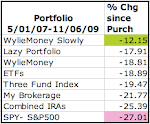Walter Updegrave at cnnmoney posted an excellent explanation of a good strategy for how to approach where to put your savings for retirement. And for those of us who work for non-profits, 403(b)s should be approached like he recommends approaching 401(k)s: contribute enough to earn your full employer's match (if any), fund a Roth IRA if you are eligible, then ad more to your 403(b).
Combining this with the typical financial planning advice- "Pay off your credit card debt first" one can come up with a guide for how to manage one's finances, but it gets a little more complicated when faced with decisions about and how much to save in non-retirement accounts. (Not to mention what debt to pay off- Credit Card debt is obvious because the interest is usually high but College debt and Mortgages are worth exploring, but not in this post.)
Walter says max out both your IRA and 401/3/k/b- and then contribute to a non-retirement account. To do this, however, you must be saving over $19,500 ($15,500+$4000). And he was addressing this to a married couple so they would have to save $39,000 a year before funding a non-retirement account. I do not believe Walter is really recommending this- he is trying to explain a way to think about retirement accounts that I agree with completely- Match your 401/3, then fund a Roth. But after that- at what point should you start saving for retirement?
Let's face it, most of us want some wealth before we reach our 60s and I am betting that by the time I reach 60 the retirement age for social security at least, will be higher than it is now.
So does it make sense to invest in a non-retirement account before maxing out your 401(k)? One thing to think about is how much retirement savings you have already and how much you are on track to have when you reach your 60s but lets look at the numbers. Say your employer matches 3% and you make around $40,000. That would mean you employer would match up to $1200 so you need to contribute that much to get the match. The maximum for an IRA is $4000, so you need to save $5200 to end up with $6400 in retirement savings for the year.
Using CNN's savings calculator which uses a high rate of return at 9%- if you are 30 and save this much until 65, you will end up with $1,380,548.83. Before you get too excited, adjusted for an assumed 3% rate of inflation, that is only equal to $475,403.62 in today's dollars- hardly enough to cover 35 years of wild and crazy retirement adventures.
But, if you contribute more each year, as you earn more and your employer matches more and IRA limits increase, you can make headway. (Notice I don't bother to include Social Security estimates- I'm a bit of a pessimist about that one). Regardless, you can use a simple calculator like this to put in your actual age and actual income and adjust the numbers to figure out how much you want to and can contribute to your retirement savings.
Lets assume for our example $5200 is enough and do-able. This comes out to about $433 per month. If you can save an additional $300 per month then you could buy three mutual funds and contribute $100 to each, every month and build up a nice non-retirement fund. Of course you will need to save up the initial minimum for each fun which for the funds we are looking at here range from $0 to $2500.
If the market does well and your Non-Retirment portfolio swells, you can tap into it to buy a home, a trip to Iceland, a diamond studded cell phone, start a charity, etc. before you turn 65. Maybe another way to think about it is: are the things you want to buy with your savings worth what you would need to do now to save that much... Saving $733 a month ends up being about $212 dollars per week.. Cancel cable, make your lunches at home and see if you can pull it off (or not if you decide you do not need that diamond studded cell phone after all).
Subscribe to:
Post Comments (Atom)



1 comment:
Very very informative and thought provoking.
I like to add some tips : Be disciplined. While its good to go to the movies, dine, have a binge once in a while, don't compromise on the money you have decided to set aside every month for retirement. And importantly do a 'cost-benefit analysis'. If the Rs 1,000 you spent on movies and dinner last week was instead invested in an equity fund, it would have grown to nearly Rs 20,000 (at 10% compounded growth) after 30 years!
Retirement Plans, Retirement Savings, Retirement Investments,Retirement Income, Retirement Funds,Home based Business
Post a Comment